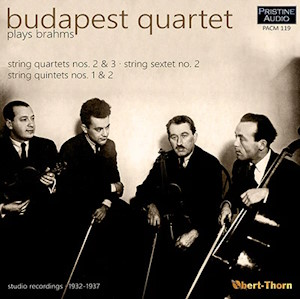
Johannes Brahms (1833-1897)
String Quartet No.2 in A minor, Op.51 No.2 (1873)
String Quartet No.3 in B flat major, Op.67 (1875)
String Sextet No.2 in G major, Op.36 (1865)
String Quintet No.1 in F major, Op.88 (1882)
String Quintet No.2 in G major, Op.111 (1890)
Budapest Quartet
Alfred Hobday (viola II: opp. 36 & 88)
Hans Mahlke (viola II: op. 111)
Anthony Pini (cello II: op. 36)
rec. 1932-37, Beethovensaal, Berlin (Opp. 67 & 111); Abbey Road Studio No.3, London (remainder)
Pristine Audio PACM119 [146]
Seldom, if ever, has a photograph exposed more graphically the seething tensions and fault lines in an ensemble than the one on the front of this release. Some mild sleuthing suggests that it was taken in America in 1934 and one sees in it the beleaguered figure of Hungarian violist István Ipólyi who stares stoically at the camera whilst his colleagues cast looks at him that one could variously describe as contemptuous, sardonic or dismissive. Just maybe the Schneider brothers are looking at each other and not at the troubled violist but it’s still an unsettling image. Two years later he was hounded out, the last Hungarian in the Budapest Quartet, replaced by Boris Kroyt. Both Kroyt and Ipólyi are represented in this twofer which charts the years 1932 to 1937.
This is the third volume in the series devoted to the quartet; the first was on PACM098 and captured the Hungarian-Dutch line-up from 1926-29 – probably the most timbrally evocative of all iterations of the ensemble – and the second volume PACM113 picked up recordings that have largely been ignored by previous restoration labels. It shared the same cover photograph as this one.
Both the Second and Third Brahms Quartets were made with Ipólyi, Op.51/2 in Abbey Road, London and Op.67 in the Beethovensaal, Berlin. Both performances are beautifully balanced and the ensemble lithe and warm without becoming in any sense glutinous – as the Lener were very occasionally to be in some repertoire. Ipólyi’s presence is all to the good. Op.67 was recorded over three days in Berlin and the music’s good-natured fluidity and the quartet’s control of dynamics are all to be savoured here, so too its dapper playing of the finale.
Whereas in the Dvořák Sextet in the second volume of this series the Quartet was teamed with Watson Forbes (viola II) and John Moore (cello II), two young players who were then part of the Stratton Quartet, for Brahms’s String Sextet HMV engaged Alfred Hobday (viola II) and Anthony Pini (cello II). Pini was young and had experience playing with the Brosa Quartet and was later to make outstanding trio recordings with Lili Kraus and Szymon Goldberg. Hobday, however, was an older, pre-Tertis player, and dryish of tone, but he had been recording for well over two decades and was vastly experienced in the chamber repertoire. He’d played second viola with the Joachim Quartet and had played Brahms with the Busch, recording Mozart Quintets with the Pro Arte (and during the First War, with the London Quartet). Hobday also appears in the String Quintet No.1, Op.88. The Sextet, Op.36 is necessarily split between discs, the first movement remaining on CD1, the remainder contained on disc 2. This was the first recording of the work since the (augmented) Spencer Dyke Quartet recording for NGS in the previous decade. This recording, and that of the String Quintet were made during the same February 1937 sessions and were recorded with remarkable clarity and these transfers sound absolutely amazing. The corporate sonority of the group, now with Kroyt, was leaner in tone but possessed a directness that was, apparently, the result of their having listened to Toscanini when touring in America.
In the Quintet, Op.111 recorded in 1932 the group was joined by violist Hans Mahlke (1889-1959) and the flexible playing is notable, as is the great refinement and delicacy of phrasing in the development of the first movement. Throughout these Brahms recordings one senses a real stylistic affinity, a willingness to exploit the myriad contrasts offered, and to generate finely calibrated energy when most needed. For reasons of timing, I assume, neither repeat in the first movement of the quintets is taken. When they re-recorded the quintets with Walter Trampler, the Budapest had arguably lost some of its youthful lustre and fire.
There’s the usual one-page producer’s note from Mark Obert-Thorn whose transfers are warmly praised.
Jonathan Woolf
Availability: Pristine Classical


















